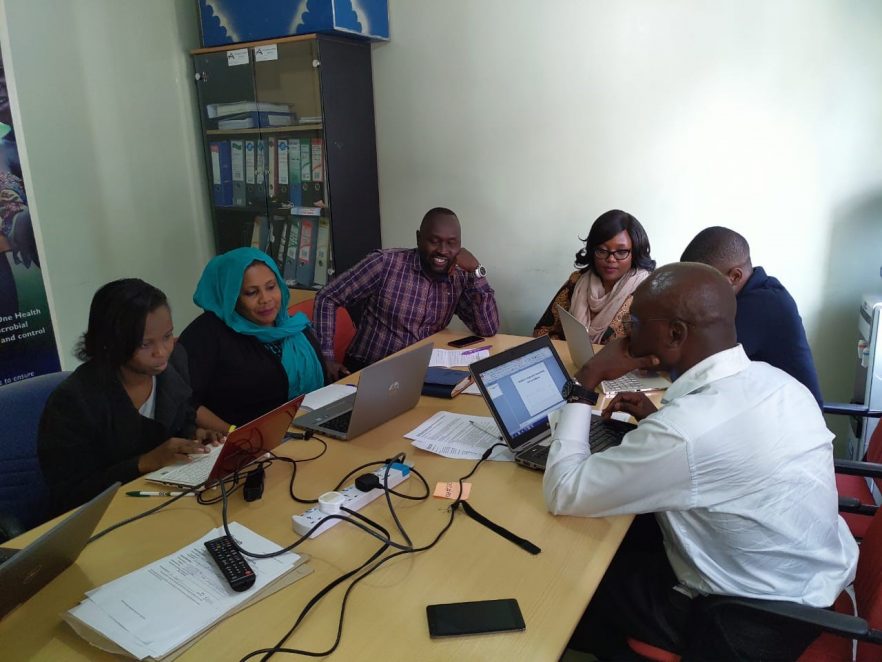Integrating Antimicrobial Stewardship into Continuing Professional Development in Kenya
By Collins Jaguga and Ndinda Kusu
Antimicrobial resistance (AMR) is a global public health concern that threatens the very core of modern medicine and effective response to infectious diseases. With few new antimicrobial agents in development, the misuse and overuse of antimicrobials in human medicine and food production places nations at risk. Kenya is no exception, and without concerted and immediate action at the national and local levels, the country stands to lose the tremendous gains made in the fight against infectious diseases.
A large proportion of antimicrobial prescriptions in Kenya are inappropriate. According to WHO, antimicrobial stewardship (AMS)―improving the use of antimicrobials―is one of the key interventions necessary to mitigate inappropriate use and contain AMR. The approach aims to narrow the gap between excess (too many antimicrobials for people who do not need them and too many large-spectrum antimicrobials used as the first choice) and access (not enough antimicrobials for people with severe infections).
Factors underlying suboptimal antimicrobial use include a lack of awareness by prescribers and the public; diagnostic uncertainty due to limitations of diagnostic tests and capacities; lack of access to treatment guidelines that account for local epidemiology; lack of data on the quality of antimicrobial prescribing and use; and an inclination to prescribe large-spectrum antimicrobials, even when narrow-spectrum alternatives are available.
Containment of AMR and access to effective therapy for common infections are critical for ensuring efficacious treatments and attaining Kenya’s goals toward universal health coverage. The government, therefore, supports AMS at the national and county levels as articulated in key national AMR policy documents. However, one of the challenges is the lack of focus on AMR in professional education, training, or certification in human and agricultural courses. When it is covered, the curriculum leans toward the biomedical and scientific aspects rather than the practical and public health-related elements critical for responsible and competent application.
Establishing AMS as an Integral Part of Health Systems
Over the past year, USAID MTaPS collaborated with various health professional associations (including Association of Kenya Medical Laboratory Scientific Officers, Kenya Medical Association, Kenya Pharmaceutical Association, and National Nurses Association of Kenya), led by the Pharmaceutical Society of Kenya (PSK) and regulatory authorities. As part of the collaboration, MTaPS used an innovative approach to develop and initiate an in-service continuing professional development (CPD) course on AMS for health care professionals. The nine-module, virtual course aims to integrate AMS into Kenya’s health system and workforce. Over 1,100 health care workers (30 medical laboratory scientists, 100 doctors, 323 nurses, and 720 pharmacists) were trained on the practical aspects of AMS in health care settings. Their participation earned the participants points from their respective regulatory bodies, including the Pharmacy and Poisons Board, the Nursing Council of Kenya, and the Kenya Medical Practitioners and Dentists Council. The points are crucial for annual renewal of practice licenses.

Discussions during the AMS curriculum development session in February 2020. Photo credit: Collins Jaguga
Recommendations from the AMS CPD Sessions:
- Introducing AMS in community-level pharmacies and remote health care facilities
- Building capacity of consultants and senior doctors in standard clinical guidelines to standardize antimicrobial prescription and of prescribers to use patient visits as an opportunity to educate them on appropriate antimicrobial use
- Addressing the shortage of surveillance data
- Having health care facilities conduct antimicrobial use surveys
- Promoting the AMR research agenda to tertiary-level students
- Advocating decision-makers on factoring AMR in developing guidelines and implementing stringent in-country regulatory measures to prevent the entry of substandard and falsified antimicrobials that contribute to AMR.
Next Steps
The recommendations will be shared with the national AMR secretariat, AMS technical working group members, the National Medicines and Therapeutics Committee, and the Pharmacy and Poisons Board, although some of them have already been addressed. Other next steps in this initiative include the scale-up of CPD sessions across the different regional chapters of PSK and other professional associations. Additionally, MTaPS is developing a PSK-led e-learning platform where members of the professional associations can access the AMS course at their convenience and learn at their own pace. These efforts to develop the capacity of health care workers on AMS is crucial for creating the awareness needed to prevent and contain AMR in Kenya.